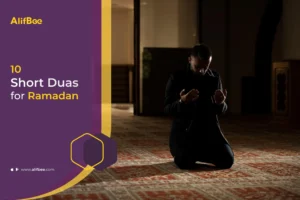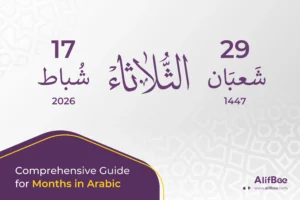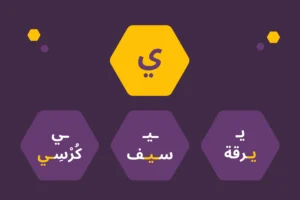More Than Just "Goodbye"
If you’ve ever found yourself at the end of a conversation in Arabic and weren’t quite sure how to say goodbye in Arabic, you’re not alone. A student of mine once told me how, during her first trip to Syria, she managed to greet everyone with a confident السلام عليكم “As-salāmu ʿalaykum”, but when it came time to leave a small café, she panicked. “Do I just wave? Say bye in English?” she asked. The waiter smiled and said gently, “Ma‘a al-salāma,” helping her learn her very first Arabic farewell.
Saying goodbye in Arabic isn’t just about parting—it’s often a kind wish, a blessing, or even a promise to meet again. Whether you’re in Egypt, Morocco, or Lebanon, the way people say farewell changes slightly, adding charm and variety to the language.
In this post, you’ll learn the eight most common ways to say goodbye in Arabic—both in Modern Standard Arabic and popular Arabic dialects—so you can end every conversation with confidence.
Arabic Greetings to Say Goodbye in Arabic
We’ll start by looking at the complete list of Arabic phrases to say goodbye, then explain each one in detail.
English
Transliteration
Arabic
Goodbye in Arabic
Ma'a al-salama
مع السَّلامة
Take care in Arabic
Iʻtani binafsek
اِعتنِ بِنَفسِك
See you in Arabic
Ila al-liqaa
إلى اللِّقاء
Peace in Arabic
Salaam
سَلام
See you soon in Arabic
Araka qariban
أراكَ قريبًا
See you later in Arabic
Araka lahiqan
أراكَ لاحقًا
Good night in Arabic
Tuṣbiḥu ʻalá Khayr
تُصبِحُ على خير
Farewell in Arabic
Wadāʿan
وَداعًا
Saying Goodbye in Arabic
English
Transliteration
Arabic
Goodbye
Ma'a al-salama
مع السَّلامة
This is the most common way to say goodbye or bye in Arabic. The phrase “ma‘a al-salāma” literally means “with peace” or “go with safety.” It’s a polite and universal farewell used across the Arabic-speaking world, suitable for both formal and informal situations.
- “Ma‘a” (مع) means “with”
- “Al-salāma” (السَّلامة) means “safety” or “peace”
So when you say “ma‘a al-salāma”, you’re wishing someone a safe and peaceful departure.
English
Transliteration
Arabic
Take care (of yourself)
Iʻtani binafsek
اِعتنِ بِنَفسِك
This Arabic phrase means “Take care of yourself” and is often used when parting with someone you care about. It expresses concern and well wishes for their well-being.
- “I‘tan(i)” – اِعتنِ is the imperative form of the verb اعتنى, which means “to take care” or “to look after.”
- “Binafsik” – بِنَفسِك means “yourself” (used when speaking to one person; you can change the ending depending on gender and number).
So, “i‘tan binafsik” is like saying: “Make sure you look after yourself.”
It’s a kind and thoughtful way to end a conversation, especially with someone you’re close to.
English
Transliteration
Arabic
See you
Ila al-liqaa
إلى اللِّقاء
This phrase is a polite and semi-formal way to say “See you” in Arabic. It expresses the hope or expectation that you’ll meet the person again.
- “Ilā” – إلى means “to” or “until”
- “Al-liqā’” – اللِّقاء means “the meeting” or “the encounter”
So, “ilā al-liqā’” literally means “until the meeting”, similar to saying “until we meet again” in English. It’s suitable for both everyday and formal conversations, especially when you want to sound courteous and warm.
English
Transliteration
Arabic
Peace
Salaam
سَلام
The word “salām” (سَلام) means “peace” in Arabic and is used as a simple, heartfelt way to say goodbye. Saying “Salām” when parting is a way of wishing someone peace and safety as they leave.
- It comes from the same root as إسلام “Islam” and السلام عليكم “As-salāmu ʿalaykum” (Peace be upon you).
So, when someone says “Salām” as a farewell, they’re leaving you with a message of peace and goodwill.
English
Transliteration
Arabic
See you soon
Araka qariban
أراكَ قريبًا
This is a common way to say “See you soon” in Arabic. It expresses the hope or expectation that you’ll see the person again in the near future.
- “Arāka” – أراكَ means “I see you”
- “Arā” is the verb “I see”,
- “ka” is the masculine singular pronoun “you”
- For a female, it would be “Arāki – أراكِ”
- “Arā” is the verb “I see”,
- “Qarīban” – قريبًا means “soon”
So, “Arāka qarīban” literally translates to “I will see you soon.”
It’s friendly and informal, and often used among friends, family, or colleagues when you expect to meet again shortly.
English
Transliteration
Arabic
See you later
Araka lahiqan
أراكَ لاحقًا
This is an informal way to say “See you later” in Arabic. It implies that you’ll meet again, but not immediately—sometime later on.
- “Arāka” – أراكَ means “I see you”
- “Arā” is the verb “I see”
- “Ka” is the masculine pronoun “you”
- For a female, it would be “Arāki – أراكِ”
- “Arā” is the verb “I see”
- “Lāḥiqan” – لاحقًا means “later” or “afterward”
So, “Arāka lāḥiqan” literally means “I will see you later.”
It’s casual and friendly—similar in tone to English expressions like “Catch you later.”
English
Transliteration
Arabic
Good night
Tuṣbiḥu ʻalá Khayr
تُصبِحُ على خير
This is a warm and traditional way to say “Good night” in Arabic. It literally means “May you wake up to goodness” or “May your morning come with well-being.” It’s commonly used in the evening, especially when parting with someone at the end of the day—whether in person, over the phone, or even in a message.
- “Tuṣbiḥu” – تُصبِحُ comes from the verb ṣabaḥa (صَبَحَ), meaning “to enter the morning” or “to wake up”
- “ʻAlá” – على means “upon”
- “Khayr” – خير means “goodness,” “peace,” or “well-being”
So when someone says “Tuṣbiḥu ʻalá khayr”, they’re wishing you a peaceful night and a good morning ahead. It’s the Arabic equivalent of “Good night” or “Sleep well”, often shared as a polite and caring farewell in the evening.
A common and thoughtful reply is: “Wa anta min ahl al-khayr” – وَأنتَ مِن أَهلِ الخير, meaning “And may you be among the people of goodness.”
English
Transliteration
Arabic
Farewell
Wadāʿan
وَداعًا
“Wadāʿan” is a more formal and emotional way to say “farewell” in Arabic. Unlike common goodbyes such as “ma‘a al-salāma” (مع السلامة) or “ilā al-liqā’” (إلى اللقاء), which imply that you’ll likely see the person again soon, “wadāʿan” often suggests a longer or more permanent goodbye.
- “Wadāʿan” – وَداعًا comes from the root w-d-ʿ (و-د-ع), which is related to leaving, parting, or bidding someone farewell.
- It’s typically used when:
- Someone is moving away or going on a long trip
- There’s uncertainty about when or if you’ll meet again
- The goodbye carries a more serious or heartfelt tone
- Someone is moving away or going on a long trip
In tone and context, “Wadāʿan” is closer to English phrases like “farewell”, “goodbye for now”, or even “goodbye forever” in some literary or dramatic uses.
While it’s perfectly correct to use in everyday Arabic, it’s less common in casual conversations and more typical in writing, formal speech, poetry, or when saying a final goodbye.
Goodbye in Arabic Dialects
The way Arab speakers say Goodbye in Arabic is slightly different across dialects, though many regions still understand the Modern Standard Arabic (MSA) phrase “مع السلامة – ma‘a al-salāma“. Below is a breakdown of how “goodbye” is commonly expressed in different Arabic dialects:
Goodbye in Egyptian Arabic
Bye
bāy
باي
God speed
Ma'a al-salama
مع السَّلامة
See you later
ashūfak baʿdein
أشوفَك بعدين
Goodbye in Levantine Arabic
With your permission
bikhāṭrak
بِخاطِرِك
Okay, bye
yalla bāy
يلّا باي
Peace
salām
سَلام
Goodbye in Maghrebi Arabic
With peace
b-slāma
بِسلامة
Take care of yourself
thallā f-rāsk
تعلّا فِراسَك
Goodbye in Gulf Arabic
In God’s protection
fī amān Allāh
في أمانِ الله
See you with good (wishes)
ashūfak ʿalā khayr
أشوفك على خير
God speed
Ma'a al-salama
مع السَّلامة
Final word
As you’ve seen, Arabic has a beautiful range of farewells—from the universal ma‘a al-salāma to the casual bāy and heartfelt tuṣbiḥ ʿalā khayr. Each expression carries a tone, a context, and sometimes even a prayer.
Learning how to say goodbye in Arabic is more than memorizing words—it’s about understanding culture, showing respect, and connecting with others in a thoughtful way.
So the next time you say goodbye in Arabic, do it with intention—and maybe even with a smile, just like that kind waiter who helped my student take her first step into the language.
To continue building your everyday Arabic vocabulary, take a look at our other guides on saying thank you in Arabic, common Arabic greetings, and asking how someone is doing.
Want to go deeper in learning Arabic? Explore Arabic expressions, greetings, and cultural insights with the AlifBee App!









